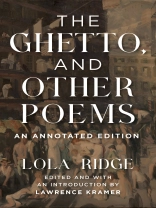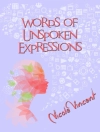At last recovered in this enriching annotated edition, this important but neglected work of American modernism offers a unique poetic encounter with the Jewish communities in New York’s Lower East Side.
Long forgotten on account of her gender and left-wing politics, Lola Ridge is finally being rediscovered and read alongside such celebrated contemporaries as Hart Crane, William Carlos Williams, and Marianne Moore—all of whom knew her and admired her work. In her time Ridge was considered one of America’s leading poets, but after her death in 1941 she and her work effectively disappeared for the next seventy-five years. Her book The Ghetto and Other Poems, is a key work of American modernism, yet it has long, and unjustly, been neglected. When it was first published in 1918—in an abbreviated version in The New Republic, then in full by B. W. Huebsch five months later—The Ghetto and Other Poems was a literary sensation. The poet Alfred Kreymbourg, in a Poetry Magazine review, praised “The Ghetto” for its “sheer passion, deadly accuracy of versatile images, beauty, richness, and incisiveness of epithet, unfolding of adventures, portraiture of emotion and thought, pageantry of pushcarts—the whole lifting, falling, stumbling, mounting to a broad, symphonic rhythm.” Louis Untermeyer, writing in The New York Evening Post, found “The Ghetto” “at once personal in its piercing sympathy and epical in its sweep. It is studded with images that are surprising and yet never strained or irrelevant; it glows with a color that is barbaric, exotic, and as local as Grand Street.”
The long title poem is a detailed and sympathetic account of life in the Jewish Ghetto of New York’s Lower East Side, with particular emphasis on the struggles and resilience of women. The subsequent section, “Manhattan Lights, ” delves further into city life and immigrant experience, illuminating life in the Bowery. Other poems stem from Ridge’s lifelong support of the American labor movement, and from her own experience as an immigrant. This critical edition seeks to recover the attention The Ghetto, and Other Poems, and in particular the title poem, lost after Ridge’s death. The poems in the volume are as aesthetically strong as they are historically revealing. Their language combines strength and directness with startling metaphors, and their form embraces both panoramic sweep and lyrical intensity.
Expertly edited and annotated by Lawrence Kramer, this first modern edition to reproduce the full 1918 publication of The Ghetto and Other Stories offers all the background and context needed for a rich, informed reading of Lola Ridge’s masterpiece.
Tabella dei contenuti
Introduction | xi
The Ghetto
To the American People | 3
The Ghetto | 5
Manhattan Lights
Manhattan | 35
Broadway | 37
Flotsam | 39
Spring | 43
Bowery Afternoon | 45
Promenade | 46
The Fog | 48
Faces | 49
Labor
Debris | 55
Dedication | 56
The Song of Iron | 57
Frank Little at Calvary | 63
Spires | 68
The Legion of Iron | 69
Fuel | 71
A Toast | 72
Accidentals
“The Everlasting Return” | 77
Palestine | 81
The Song | 82
To the Others | 83
Babel | 84
The Fiddler | 85
Dawn Wind | 86
North Wind | 88
The Destroyer | 89
Lullaby | 90
The Foundling | 92
The Woman with Jewels | 93
Submerged | 95
Art and Life | 96
Brooklyn Bridge | 97
Dreams | 98
The Fire | 99
A Memory | 100
The Edge | 101
The Garden | 103
Under-Song | 105
A Worn Rose | 107
Iron Wine | 108
Dispossessed | 109
The Star | 111
The Tidings | 112
Appendix : The New Republic Version of “The Ghetto” | 115
References | 133
Circa l’autore
Lawrence Kramer is Distinguished Professor of English and Music at Fordham University. He is the author of fifteen books, as well as editor of two previous annotated editions of poetry: Walt Whitman’s Drum-Taps: The Complete 1865 Edition (NYRB, 2015) and Hart Crane’s ‘The Bridge’: An Annotated Edition (Fordham, 2011).












